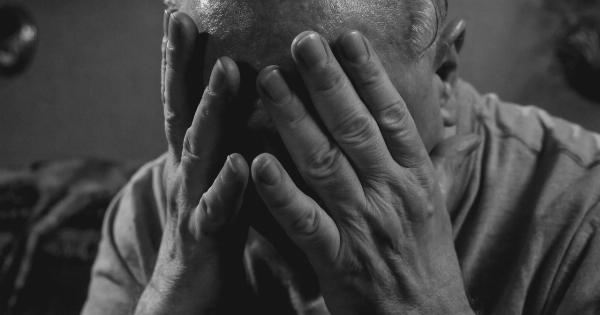Premature ejaculation (PE), is a common sexual disorder among men, where ejaculation occurs sooner than desired, leading to unsatisfactory sexual experience for men and their partners.
This problem is experienced by up to 30% of men, with a host of causes ranging from psychological issues, to performance anxiety, physical issues, and even genetic predisposition. It is important to identify the causes of PE and seek proper treatment to improve sexual health and overall well-being.
Psychological Causes of Premature Ejaculation
Psychological factors are the most common causes of premature ejaculation among men. Here are some of the most common psychological causes:.
Anxiety and Stress
Men who suffer from anxiety or stress are likely to have difficulties with controlling their ejaculatory response during sexual intercourse.
This is because anxiety and stress release the hormone cortisol, which can lead to a heightened state of arousal and increased sensitivity. This can lead to premature ejaculation.
Depression
Depression can lead to loss of self-esteem and confidence, which can affect sexual performance. Men who suffer from depression may have reduced sex drive.
When they do engage in sexual activities, it may lead to premature ejaculation and overall unsatisfactory sexual experience. .
Relationship Issues
Relationship problems such as poor communication, lack of intimacy, and unresolved conflicts can cause premature ejaculation.
These issues may lead to anxiety, lack of trust, and decreased sexual desire, resulting in a negative feedback loop that ends in premature ejaculation.
Physiological Causes of Premature Ejaculation
Physiological factors can also contribute to premature ejaculation, including:.
Hormonal Imbalance
Hormonal changes in the body can cause premature ejaculation. Testosterone is a hormone that is responsible for libido, sexual arousal, and orgasm.
Men who have low levels of testosterone, or those diagnosed with hypogonadism, may experience premature ejaculation and erectile dysfunction.
Inflammation or Infection of the Prostate Gland
Prostatitis is the inflammation of the prostate gland, which can lead to painful and difficult urination, pelvic pain, and ejaculation disorders. Men who suffer from prostatitis may experience premature ejaculation, and other sexual dysfunctions. .
Neurological Factors
Damage or dysfunction of the nervous system can lead to premature ejaculation. Neurological conditions such as multiple sclerosis, Parkinson’s disease, and spinal cord injuries can affect the nerves that control the ejaculatory response.
When these nerves are damaged, men may experience premature ejaculation.
Lifestyle Factors and Behavioral Causes of Premature Ejaculation
Lifestyle factors and behavioral causes can also lead to premature ejaculation, including:.
Alcohol and Drug Use
Alcohol abuse and drug use can affect sexual performance and lead to premature ejaculation. Alcohol and drug abuse affect the central nervous system, causing heightened states of arousal and decreasing sexual inhibitions.
This can lead to premature ejaculation and other sexual dysfunctions.
Smoking
Smoking can cause damage to the circulatory system, leading to reduced blood flow and nerve damage, which can cause premature ejaculation.
Smoking can also damage the lungs and lead to chronic bronchitis or emphysema, which can make sexual activity more difficult and uncomfortable.
Poor Masturbation Habits
Men who engage in frequent or hurried masturbation may become conditioned to ejaculate quickly, leading to premature ejaculation during sexual intercourse.
This is because the body has become accustomed to the short and quick ejaculatory response during masturbation, and is unable to sustain a longer ejaculatory response during intercourse. .
Treatments for Premature Ejaculation
Premature ejaculation can be treated with a variety of approaches, depending on the underlying cause and severity of the condition. Some of the common treatments include:.
Behavioral Techniques
Behavioral techniques such as the squeeze technique, start-stop technique, and pelvic floor muscle exercises have been shown to be effective in treating premature ejaculation.
These techniques involve retraining the body and the mind to better control the ejaculatory response and prolong sexual pleasure during intercourse. .
Medication
Medications such as selective serotonin reuptake inhibitors (SSRIs), Tramadol, and topical anesthetics can be used to treat premature ejaculation.
These medications work by altering the levels of serotonin in the brain and reducing sensitivity in the penis, which can lead to delayed ejaculation. It is important to note that these medications may cause side effects, and should only be taken under a doctor’s supervision.
Therapy
Therapy can help identify and treat the psychological factors causing premature ejaculation. Therapy can help improve communication, identify and resolve relationship issues, and develop coping mechanisms for anxiety, depression, and stress.
Conclusion
Premature ejaculation is a common issue among men that can lead to unsatisfactory sexual experiences and reduced quality of life. It is important to identify the underlying causes of premature ejaculation and seek proper treatment.
Some of the common causes of premature ejaculation include psychological issues such as anxiety, depression, and relationship problems, as well as physiological factors such as hormonal imbalances and neurological dysfunction. Lifestyle factors such as alcohol and drug abuse, smoking, and poor masturbation habits can also contribute to premature ejaculation. Treatment options for premature ejaculation include behavioral techniques, medication, and therapy.
It is important to work with a doctor to find the best treatment approach for each individual case.






























